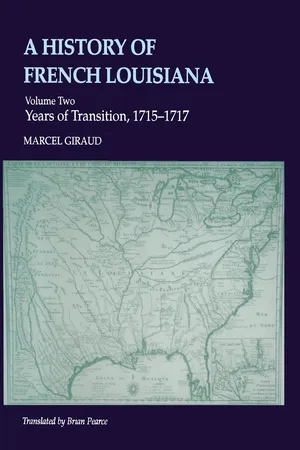
A History of French Louisiana
Years of Transition, 1715–1717
- 248 pages
- English
- ePUB (mobile friendly)
- Available on iOS & Android
A History of French Louisiana
Years of Transition, 1715–1717
About this book
The death of Louis XIV in 1715 and the accession of his more progressive younger brother as Regent of France might have brought some hopeful changes to Louisiana, France's tiny, struggling outpost on the Gulf of Mexico. However, the continuation of the debilitating regime of the merchant Antoine Crozat and the extreme impoverishment of the French Treasury Following the disastrous wars of Louis XIV meant that no radical changes were possible. Instead, these few years at the beginning of the Regency represented a period of transition for the colony, when the need for a new administrative regime for Louisiana was met in France by a growing awareness of the strategic and economic potential of the Mississippi settlements. All of these conditions prepared the way for the appearance on the scene of the Company of the West in 1717.
In his detailed survey of this brief but crucial period of Louisiana's history, Marcel Giraud assesses the new mood and conditions in France—the personnel and objectives of the Council of the Navy, which oversaw the colony's administration; the advances in scientific opinion and their impact on Louisiana; and the political, fiscal, and economic conditions that created a new appreciation of the colony of official circles—while describing actual conditions in the colony. Giraud portrays the Louisiana of 1715 as a few clusters of squalid buildings scattered along the Gulf Coast from Alabama to Natchitoches, inhabited by largely dispirited settlers and soldiers who for the most part lacked the barest necessities of life.
Crozat's essentially self-serving regime made this a period of virtual stagnation. Rivalries among the colony's administrative personnel, especially between the governors and the Le Moyne family and their supporters, impeded development, as did the inadequacy of the priests sent to minister to the colony; the paucity of women, farmers, and skilled workers; and the infertile soil around the sties chosen for the forts and settlements.
Relations with the indigenous populations were hindered by the lack of acceptable trade goods, as were efforts by the French colonists to establish commercial relations with the neighboring Spanish colonies. At the same time, Louisiana bore the encroachments of better-supplied British traders who were moving into Alabama and the Illinois country and developing regular trade with Indian tribes whom the French claimed as their own clients. With his customary thoroughness and scrupulous attention to documentary details, Marcel Giraud provides a vivid description of a struggling colony hovering between extinction and the spark of growth that would, in years to come, establish it as a viable French outpost in North America. Despite the obstacles facing Louisiana during these difficult years of transition, the colony survived to experience new expansion and development under the Company of the West.
Frequently asked questions
- Essential is ideal for learners and professionals who enjoy exploring a wide range of subjects. Access the Essential Library with 800,000+ trusted titles and best-sellers across business, personal growth, and the humanities. Includes unlimited reading time and Standard Read Aloud voice.
- Complete: Perfect for advanced learners and researchers needing full, unrestricted access. Unlock 1.4M+ books across hundreds of subjects, including academic and specialized titles. The Complete Plan also includes advanced features like Premium Read Aloud and Research Assistant.
Please note we cannot support devices running on iOS 13 and Android 7 or earlier. Learn more about using the app.
Information
Index
Table of contents
- Cover
- Title Page
- Copyright Page
- Contents
- Maps
- Introduction
- Abbreviations
- I. The Council of the Navy and Some New Personalities
- II. Louisiana and Scientific Opinion
- III. The New Tendencies
- IV. Crozat’s Views and Influence
- V. Financial Difficulties
- VI. The End of Crozat’s Monopoly
- VII. The Government and Its Personalities
- VIII. The Defense of the Colony
- IX. Emigration and Colonial Society
- X. Economie Stagnation
- XI. Occupation of the Hinterland
- XII. Native Policy and the Conflict with the British
- XIII. Tension Between France and Spain
- Bibliography
- Index